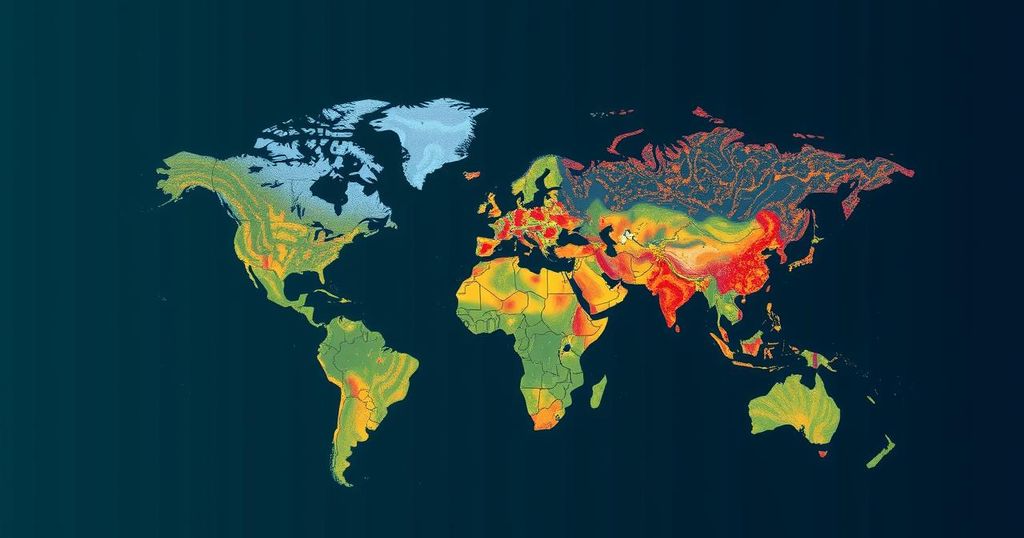Climate Change Significantly Threatens Global Health: Lancet Report

A major report indicates that climate change poses unprecedented threats to human health, with 10 out of 15 health indicators reaching record levels. Key findings include a 167% increase in elderly heat-related deaths since the 1990s, a record five million dengue cases, and the loss of significant tree cover. While there are some improvements in reducing air pollution and increasing renewable energy use, immediate action is critical to prevent further deterioration of health outcomes related to climate change.
A recent report highlights that climate change is increasingly endangering human health in unprecedented ways, with experts emphasizing that “wasted time has been paid in lives.” As 2023 is projected to be the hottest year on record, this report emerges amidst escalating heatwaves, hurricanes, and floods. The report, known as the eighth Lancet Countdown on health and climate change, was compiled by a team of 122 specialists, including representatives from prominent entities such as the World Health Organization. The findings indicate that 10 out of 15 indicators they have tracked over the past eight years have reached alarming new highs, revealing trends including increased extreme weather events, rising elderly mortality rates due to heat, the spread of infectious diseases, and food scarcity exacerbated by droughts and floods. Executive Director Marina Romanello articulated that these findings illustrate “record threats to the health and survival of people in every country, to levels we have never seen before.” The statistics are particularly striking, as the number of deaths among individuals over 65 due to heat stress has surged by 167 percent since the 1990s. Additionally, the report noted that last year marked a new high with over five million cases of dengue globally, attributing this rise to the expanded habitat range for mosquitoes resulting from rising temperatures. Furthermore, the report indicates that approximately five percent of the world’s tree cover was lost between 2016 and 2022, diminishing the planet’s ability to absorb carbon dioxide emissions effectively. It also scrutinizes the role of oil and gas companies, alongside specific governments and financial institutions, in perpetuating climate change, noting that despite ongoing warnings, greenhouse gas emissions rose again last year. In 2022, fossil fuel subsidies amounted to a staggering $1.4 trillion, overshadowing commitments made for a sustainable transition to a healthier future. Despite these dismal statistics, Romanello highlighted some positive trends, such as a reduction in deaths attributed to fossil fuel-related air pollution, which decreased by nearly seven percent from 2016 to 2021, and an increase in the share of clean renewables used for electricity generation, which nearly doubled to 10.5 percent. Looking ahead, she underscored the importance of collective action, stating, “If action is not taken today, the future will be very dangerous,” and reiterated that “there is really no more time to waste” in addressing these pressing health and environmental threats.
The topic of climate change has gained significant attention in recent years, particularly due to its numerous adverse effects on health and the environment. The Lancet Countdown series, which focuses on the critical nexus between health and climate change, provides annual insights into how these two spheres interact. With climate change escalating due to human activity, there are mounting concerns regarding public health implications, which include increasing prevalence of heat-related illnesses, respiratory diseases from air pollution, and the rise of vector-borne diseases as seen with mosquito-borne illnesses. Through comprehensive data analysis and research, the report aims to inform policymakers and the public about the urgency of addressing climate change to protect human health.
In conclusion, the report outlines the alarming health risks posed by climate change, citing record levels of mortality, disease propagation, and food insecurity as significant consequences of inaction. While there are some positive developments in reducing pollution and increasing renewable energy use, the pressing urgency for immediate action is clear. As the world anticipates critical upcoming climate talks, the imperative to prioritize health considerations within climate policy remains paramount. Stakeholders are encouraged to adopt sustainable practices in their daily lives and support initiatives that mitigate the impact of climate change.
Original Source: www.barrons.com






